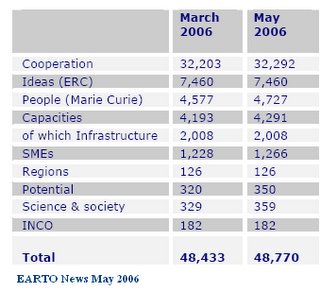EU research budget 2007 - 2013, FP7
 The Europe Union is finalising its budget for Framework Programme Seven. So its time to check the figures.
The Europe Union is finalising its budget for Framework Programme Seven. So its time to check the figures.To those who are not in the know, FP7 is the programme through which the European Commission will manage the allocation of its budget for R&D in scientific research and technology development - with the strategic aim to strengthen the European economy and global competitive position. Aligning R&D investment with societal, business, global and economic needs and challenges sits at the heart of the Commissions objectives for FP7.
Today Cordis released a news article indicating that the Commission will be adopting "an amended proposal for the Seventh Framework Programme (FP7), which seeks to incorporate amendments made by the European Parliament and the Council of Ministers in their first readings"
FP7 will run for a period of 7 years, from 2007 to 2013. During 2005 the Commission's proposed budget was around 72 billion euro. The budget for FP7 now stands near 48 billion euro, as indicated by EARTO in their news release during May 2006.
 The budget for FP6 was 16.3 billion euros and ran over a five year period from 2002 to 2006, for 15 member states. FP7 will be running over 7 years with 25 member states all seeking to participate and access to their share of the funds.
The budget for FP6 was 16.3 billion euros and ran over a five year period from 2002 to 2006, for 15 member states. FP7 will be running over 7 years with 25 member states all seeking to participate and access to their share of the funds. If you have been following the progress of FP7, you will already know that it includes the establishment of a European Reseach Council (ERC) . The ERC will focus on leading edge frontier reseach, with its activities been very much independent of the themes segmented in "Cooperation". ERC will have the ability to conduct its own strategic studies to help direct its operations and activities.
When the Commission initially put forward its proposal for FP7 during April 2005, it requested 11,826 billion euros. Since then the figure has been reduced significantly to 7,460 billion euro.
MEPs have requested a review of the ERC during 2008. The Commission requires more time before a viable review is possible. Janez Potocnik, the EU Commissioner for Science and Research has agreed with the European Parliment that the ERC review will be no later than 2010.
Shak Gohir
Business & Programme Manager
Labels: Cenamps, EU, FP7, Investment, Trends



